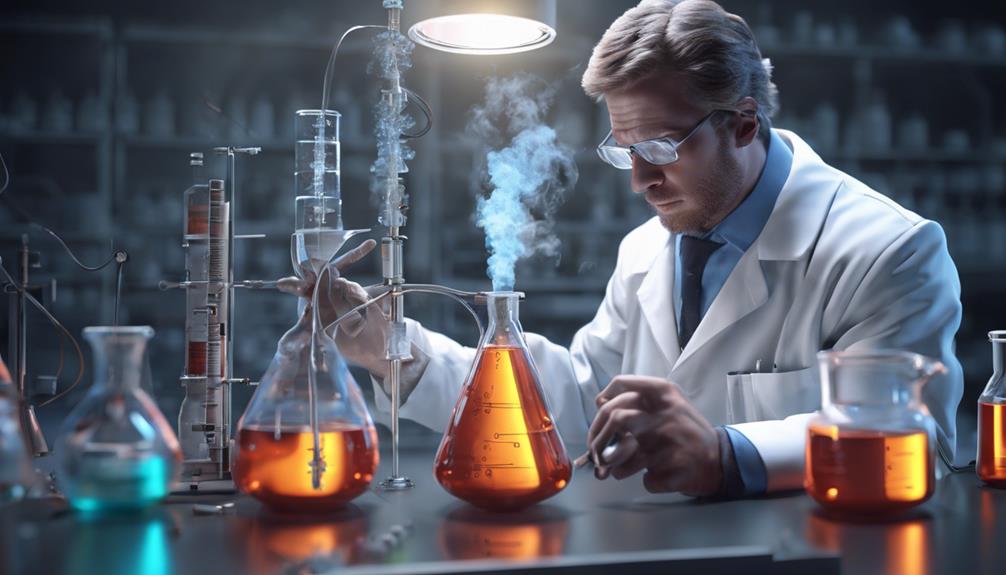Electrochemist Job Description
An electrochemist is responsible for designing and conducting lab experiments to investigate electrochemical reactions, contributing to energy storage and corrosion prevention. This role demands mastery in electrochemical techniques, precise data interpretation, and troubleshooting skills. Educational requirements typically include at least a Bachelor's degree in chemistry or chemical engineering, with higher roles necessitating a Master's or Ph.D. Continuous professional development is key for growth, with tools like potentiostats and techniques such as cyclic voltammetry and impedance spectroscopy commonly employed. Career opportunities span research, quality control, and managerial positions in various industries. Mastering these aspects unleashes potential in shaping industry trends and innovations.
Key Takeaways
- Design and conduct lab experiments to study electrochemical reactions accurately.
- Utilize various electrochemical techniques for data interpretation and troubleshooting.
- Educational requirements include a Ph.D. in electrochemistry for advanced roles.
- Career opportunities include research, manufacturing, sustainability, and leadership positions.
- Stay updated on industry trends to contribute to advancements in energy storage and corrosion prevention.
Roles and Responsibilities
In the domain of electrochemistry, the role of an electrochemist involves a myriad of important roles and responsibilities that are necessary for the comprehension and progression of electrochemical processes. One primary responsibility of an electrochemist is to design and conduct lab experiments to study various electrochemical reactions. This includes setting up experimental apparatus, preparing electrolytes, and monitoring reactions to gather data.
Data analysis is an essential aspect of an electrochemist's role. After conducting lab experiments, electrochemists meticulously analyze the collected data using statistical tools and software. They interpret the results to draw conclusions about the mechanisms and kinetics of the electrochemical processes under investigation. This analysis often involves creating graphs, charts, and tables to visualize the data effectively.
Moreover, electrochemists are responsible for maintaining accurate records of experimental procedures and results. Documenting procedures, observations, and outcomes is essential for ensuring reproducibility and traceability in research. Additionally, electrochemists may collaborate with other scientists and researchers to share findings and contribute to the collective understanding of electrochemical phenomena.
Essential Skills and Competencies
What key skills and competencies are essential for a successful electrochemist in the field of electrochemistry? Electrochemists require a unique set of skills to excel in their roles. Proficiency in conducting precise lab experiments and analyzing complex data are paramount for success in this specialized field.
| Essential Skills | Description |
|---|---|
| Lab Techniques | Mastery of various electrochemical techniques such as cyclic voltammetry and impedance spectroscopy. |
| Analytical Skills | Ability to interpret data accurately and draw meaningful conclusions from experimental results. |
| Problem-Solving | Aptitude for troubleshooting equipment and experimental setups to maintain accurate and reliable results. |
| Attention to Detail | Precision in executing experiments and recording data to preserve the integrity of research findings. |
These skills are essential for electrochemists to design experiments, collect precise data, and derive meaningful insights in the dynamic field of electrochemistry. By honing these competencies, professionals can contribute significantly to advancements in energy storage, corrosion prevention, and other critical areas of research.
Educational Requirements
Proficiency in electrochemistry demands a foundational academic background with a focus on specific disciplines. To excel in this field, individuals typically require the following educational requirements:
- Bachelor's Degree: A minimum requirement for entry-level positions, a bachelor's degree in chemistry, chemical engineering, or a related field provides fundamental knowledge in electrochemistry principles.
- Master's Degree: Pursuing further education with a master's degree specializing in electrochemistry can enhance understanding of complex electrochemical processes and provide opportunities for advanced research.
- Ph.D.: For roles involving advanced research, development, or academia, a Ph.D. in electrochemistry or a closely related field is often necessary.
- Continuous Professional Development: Staying current with advancements in electrochemistry through seminars, workshops, and industry conferences is pivotal for professional growth and maintaining expertise in the field.
In the dynamic field of electrochemistry, a combination of formal education and ongoing professional development is essential for success and advancement.
Tools and Techniques Used
Effectively utilizing a diverse array of specialized tools and techniques is essential in the practice of electrochemistry. In the experimental setup, electrochemists commonly use tools like potentiostats, which regulate the potential difference between electrodes, and various types of electrodes such as working, reference, and counter electrodes. Techniques like cyclic voltammetry are frequently used to study redox reactions. Data analysis involves interpreting results from electrochemical measurements using software like Origin or MATLAB to generate graphs and extract relevant information.
Electrochemical measurements are vital in understanding reaction mechanisms and kinetics. Techniques such as chronoamperometry and impedance spectroscopy provide valuable information about reaction rates and charge transfer processes at electrode interfaces. Troubleshooting skills are important when facing issues such as unstable currents or unexpected results. Electrochemists must be skilled at diagnosing problems in the experimental setup and identifying solutions to guarantee accurate data collection.
Career Opportunities and Growth
Exploring the field of electrochemistry opens up a wide range of career opportunities and avenues for professional growth. As the demand for sustainable energy solutions and advanced materials continues to rise, electrochemists are increasingly sought after in various industries. Here are some key career opportunities and growth prospects in the field:
- Research and Development: Many electrochemists find rewarding careers in research institutions, working on cutting-edge projects to develop new technologies and improve existing ones.
- Manufacturing and Quality Control: Electrochemists play an essential role in manufacturing processes, ensuring the quality and efficiency of electrochemical products and systems.
- Environmental Consulting: With a focus on sustainability and green technologies, electrochemists can work in environmental consulting firms to address pollution control and renewable energy solutions.
- Career Advancement: Through continuous learning and staying abreast of industry trends, electrochemists can advance to managerial or leadership positions, driving innovation and shaping the future of the field.
Conclusion
To sum up, the electrochemist plays a vital role in the field of chemistry by studying and understanding the principles of electrochemistry.
They are responsible for conducting experiments, analyzing data, and developing new technologies.
With their specialized skills and knowledge, electrochemists contribute to advancements in various industries such as energy storage, corrosion prevention, and materials science.
This career offers opportunities for professional growth and development in a highly specialized and demanding field.







